“We ain’t tourist’s honey — travelers, buy there or mail it back.”
A friend of the Old Pirate.
Remember July 15 in National be a Dork Day.
Be a Dork, I know you can do it.
TODAY FROM ITALY:
A. POOKIE’S ADVENTURES IN CROATIA:
It was a lovely sunny warm morning when we left for Croatia. Our first stop, of course, was at Lucia’s Petite Cafe for coffee, brioche, and hugs. For me, it was especially sad, since at my age I cannot know if I will be back again. I even hugged Danielle, Lucia’s somewhat dissolute and shaggy boyfriend. Then we were off.
The drive to the border of Italy and Slovenia was relatively brief. We passed Trieste on the way, a surprisingly small city nestled among relatively gentle hills surrounding the bay and the Adriatic.
After a drive of not much more than a mile from the Slovenian border we reached its border with Croatia and passed through without incident. This portion of Croatia, Istria, had been part of Italy or some Italian City State since Roman times except for a period of Austro-Hungarian rule in the 18 and 19th Centuries but eventually passed to the old Yugoslavia after WWII.
After a brief drive through some low hills, we entered a low flat plain containing Mediterranean type forest vegetation and few people. According to Hank, Goldman Sachs plans to buy up just about everything it can get its hands on in this area, even its toll roads (one or more of the people we will be partying with over the next two days is [are] involved somehow). They want to make it into a tech hub for Europe like Silicon Valley (Facebook already is building a facility) and some sort of Adriatic vacation paradise. In the meantime, it remains someplace one would like to visit, easy going, pretty and slow moving.
Our first stop was at some Trulli type buildings. Actually our first two stops. Initially, we halted at the side of the road to view an abandoned Trulli. A road maintenance vehicle then appeared to see if we needed any assistance. After explaining that we stopped only so I could take a photograph of the abandoned building, the worker then offered to sell us truffles, olive oil, and grappa. Hank bought some truffles, I took some photos and we continued on our way.
A short time later we stopped at a place with considerably more of those buildings, in fact, the whole area was some sort of archeological park. Trulli-type buildings are conical stone buildings common throughout Europe in one form or another. They were built mostly in the 19th century as agriculture in Europe moved into less ideal areas because of rising demand. The buildings (and walls) were built from the stones taken out of the cleared lands. The most famous or at least picturesque of these are the large conical stone homes In Puglia, Italy. Since that portion of the trip had been jettisoned for logistical reasons, I felt that a photograph of me standing beside any like structure would be a satisfactory replacement.
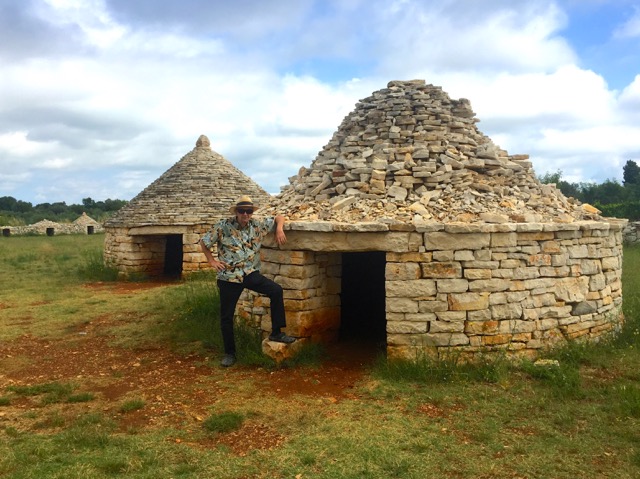
Pookie and the Trulli in Croatia
We eventually arrived at our hotel near Pula. A nice little place not too far from the harbor where the ferry to the Island National Park disembarks.
Many stories I either heard, saw or experienced on this part of my trip — much too many to write about here but some of those I remember most vividly follow. Many were told by Hank. But, be aware, their veracity depends upon: the accuracy of my memory; may be affected by what I may have thought I had been told; my additions where I could not recall what I had been told; what for one reason or another I avoided; and whatever I have added in an effort to make the story more interesting, After all, isn’t that what history is all about, a few truths surrounded by a lot of little lies and highlighted by a few big ones.
To pass the time on the drive, Hank told me the story of Paul Bingham who was Tennessee Williams lover at one time and lived at Hank’s house and died there. Hank ended up with many of the letters that passed between Paul and Tennessee which he still has. He also told me about someone he called “Doc.” Doc was one of Hank’s professors at college. When Doc retired from teaching he also retired his suits and other clothing replacing them with bib overalls, tee shirts, and black work boots. With the time on his hands that often comes with retirement, Doc got involved in various dicey projects and would often persuade Hank to join him — apparently a not too difficult task. Projects like growing okra for profit. One time Doc went into the illegal fireworks business and blew up his house. Homeless, he moved in with Hank and stayed there until he died.
We arrived at our hotel, a pleasant little place not too far from Pula and near the warm where the boats depart for a national park located on an island a few hundred yards away. After checking in we left to visit our friends at Tito’s old vacation estate.
We arrived at Marshal Tito’s vacation estate in Pula on the Adriatic coast at a place called Volkane.
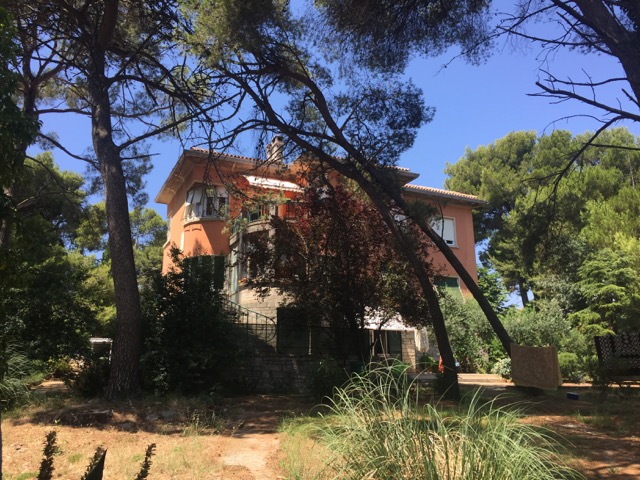
Tito’s villa
Tito had the villa built to his specifications. He also had all the lands that could be seen from the Villa which were treeless, reforested — planting over a million trees in the area. Now that the trees have reached maturity some of the people in the area complain that the trees obstruct their view of the water and of the other trees.
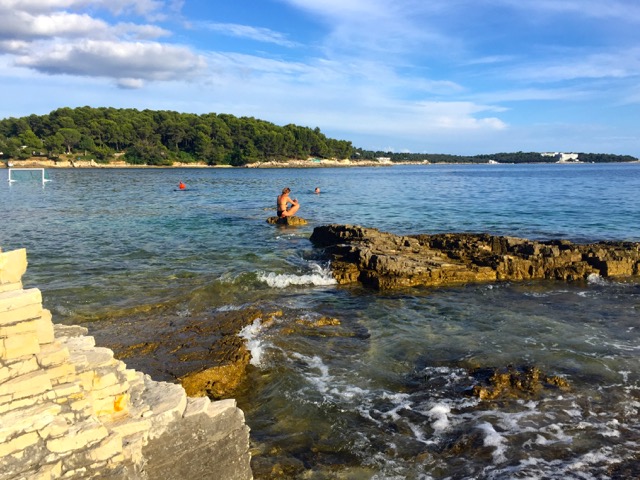
The view from the terrace
At some point, Tito gifted the villa to his chief of intelligence. That spy’s daughter lives there now with her husband an ex-marine officer who at one point had been an Assistant Under-secretary of Defense for the US by the name Jolly (he was the tallest man in the marines at the time and was nicknamed the Jolly Green Giant shortened to Jolly. He liked the name and it stuck.) He was a trained psychologist and was sent around the world to, as he put it to me, “Find out the truth.”
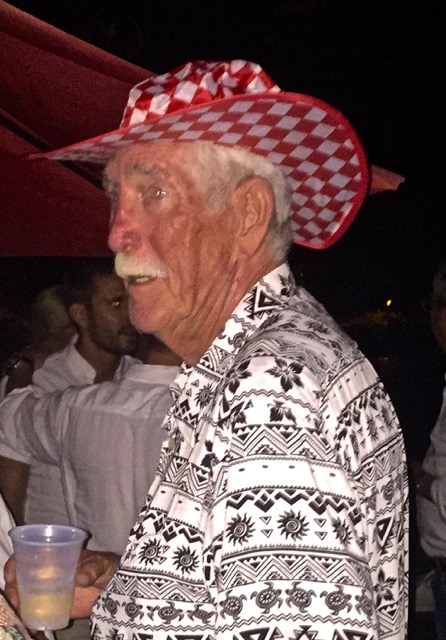
Jolly
The villa and part of the estate stand upon an old Nazi bunker one entrance of which remains. An ancient Roman wall surrounds part of the estate.
Every year on or around the 4th of July, Jolly and his wife hold a party for about two hundred of their nearest and dearest friends among which, due to Hank and Camille, I found myself included.
On my first day at Volkane, I met some of those that lived there, the sisters of the spy’s daughter and other relatives and friends who visited during the day. I also stared a lot at the pleasant view of the Adriatic. The air was warm, full and restful. I walked several times through the gate onto the rocks by the water and along the shore to a bench where I would sit for a half hour or so after which I would make my way back.
In front of the villa, there was parked a large black Mercedes. I was told the Mercedes once belonged to Tito. It now belongs to an aging local rock star who lives in one of the three units the villa had been divided into after Tito’s death. The name of the rock group was Atomic Shelter and had a bit of a reputation in eastern Europe.
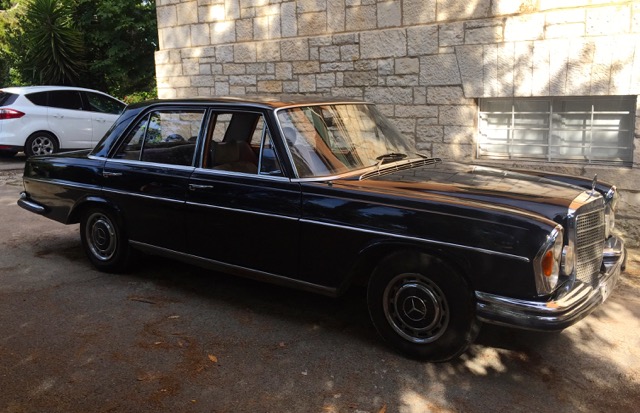
Tito’s wheels
A lot of time was spent telling stories. Mostly by Jolly about his life and times in the military and going and coming from some clandestine doings in some backwater somewhere, but never about the nature of the clandestine doings themselves. Most of the stories, I do not remember, or remember vaguely, his time in Thailand, his selection for his job or jobs and so on.
He told one about his great-great-grandfather, Christopher Sheats. Sheats from Winston County Alabama was one of the delegates to the convention of southerners who drafted the Articles of Succession that began the Civil War. He objected to secession but lost. Upon returning to Winston County he, at a meeting of Union sympathizers held in Looney’s Tavern, a local meeting place and center of Pro-Union sentiment, declared the county a free state arguing that if states had an inalienable right to secede from the Union than counties have the same inalienable right to secede from a state. He called it the Free State of Winston and sought to join the Union. The Confederate State of Alabama arrested him and sentenced him to death by hanging as a traitor. The rope broke saving him. He was imprisoned and escaped, fought for the Union using freed slaves and, according to Jolly, never lost a battle. After the war, he served in Congress. Because of threats on his life, President Grant appointed him Ambassador to Finland. After he died, the county refused to bury him in the whites-only cemetery so he was buried in the Blacks-only cemetery with many black people attending the ceremony. Since then almost all members of the Sheats family have chosen to be buried in that same black cemetery. The Incident at Looney’s Tavern, a musical drama performed regularly in Winston County, tells the story of Christopher Sheats and the Unionist meeting at Looney’s Tavern. It is the official state outdoor musical drama of Alabama.
Another story I remember from lunch the following day — Jolly had been asked to serve as a chief judge in the court-martial of a women soldier who, when told her husband had taken a women into their bed while she was at the base, bought a 45, went home, and promptly shot he erring husband in the nuts.
The young military attorney from the Judge Advocate General’s office chosen to prosecute her charged her only with assault with intent to kill. At the trial, when questioning her the young attorney asked, “Sergeant ___ when you shot your husband you intended to kill him did you not?” She pointed to a gold marksman medal on her uniform. “ See this” she responded, “I won the pistol shooting competition at the Olympics and when I qualified as a marine marksman they gave me a gold marksman medal rather than the silver in honor of my Olympic victory. I assure you I intended to shoot him in the nuts. If I wanted him dead he would be dead.” Jolly and the other judges ruled her innocent of the charge, stating, “The defendant may be guilty of many things regarding the shooting, but not of the only charge before us today, shooting with the intent to kill”
A few years later it happened that the sergeant was assigned to Jolly’s unit. When he asked her about the trial she told him that, had she been charged with anything else, she would have pleaded guilty, but not to the charge of intent to kill. When Jolly inquired as to how she has been doing since then, she responded, “Pretty well sir, but it’s been hard to get a date.” (Note, I suspect Jolly made this one up because I seem to remember having heard tales like this before but who knows maybe those tales were about Jolly.)
We had lunch, with a small group on the terrace that day.
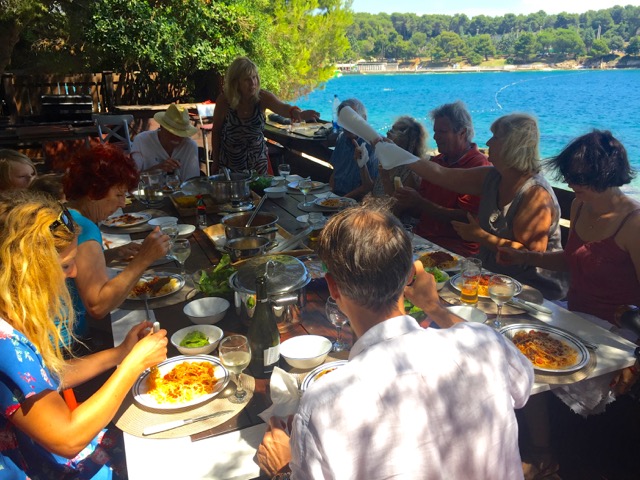
Lunch on the terrace
After the lunch, Hank told me a story about the sister of Jolly’s wife, Mary (she is the blond woman second on the right in the photograph). When she was about three or four years old she had been captured by the Nazi’s but released in a prisoner exchange. A year or two later she was trained by her parents to operate the clandestine radio transmitter that was secreted in a place too small to get into for anyone but her and thereby able to avoid the Nazi search teams.
The next day was Market Day in Pula, the streets were full of stalls selling whatever and everything. I could smell the aroma of freshly baked bread. The cafes, like the streets, were awash with people. The place seemed vibrant and alive as did many of the tourist cities in Italy when I first visited them 40 or 50 years ago. Now with prosperity, restoration, tourism, and the departure of the young to the largest cities they often appear dead, dying or mausoleums celebrating a culture that never existed. Cities are always becoming, a mixture of despair and of hope. When they don’t change they die no matter how pretty they may appear.
I strolled through the town, drank prosecco in the cafes, browsed the stores and visited the port and the Roman ruins. There’s a bitchin Roman Arena here also. It seems those Romans dropped them everywhere like rice at a wedding. When one considers the cost and turmoil surrounding the building of the relatively few large sports areas around the world today, the efforts of the Romans seem even more amazing.
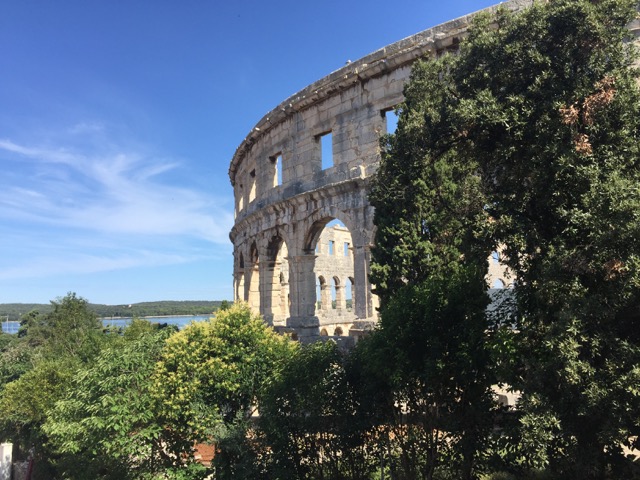
The Amphitheater
The following evening was the big party. It was also the night of the World Cup match between Croatia and Russia. A large screen was set up so everyone could watch the game and eat hot dogs and hamburgers before the party began. There were many local notables including the head of Goldman Sachs for this area and much of adjacent Europe. I was told he was an ex-Mossad agent.
Now you must be wondering why and how over the last month or so I have managed to come upon so many ex-spies or relatives of ex-spies — Two in the Enchanted Forest; one who I met two days before in Sacile retired from the military whose job he said was to examine military construction sites in areas of American troop deployment; Jolly; his wife; and now the Mossad agent and god knows how many others were at the party. One must remember, however, all these people are from my generation and the following one. The generations who lived their productive years from the sixties through the eighties, the Spy vs Spy era when anyone who was anyone spied on someone or believed one lived under their bed or were entertained by stories about spies. It was the James Bond era.
Croatia won. The crowd went crazy.
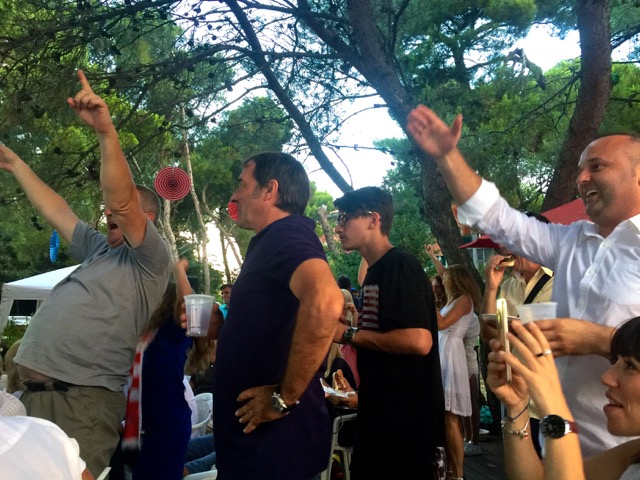
Croatia scores
The music started. Everyone drank too much. I got kissed by two Young Croat women who I am positive either they only wanted to take a photograph of themselves kissing the old codger staggering around with the cane or they were drunk.
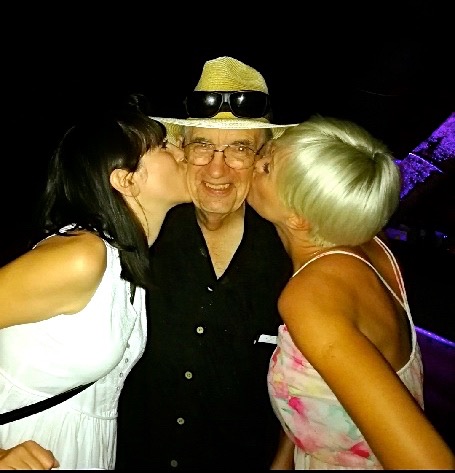
The next morning we left for Southern Italy and the rest of our trip.
B. TO NAPLES AND BEYOND:
We left Pula at about 8:30AM and drove south through Italy, getting lost only once until at 5PM we arrived at a surprisingly nice hotel with the improbable name of Hotel Gentiluomo just outside of Arezzo. It was owned by an Indian company and we shared the place with an Indian tour group all saried and caste marked up. While they ate various curries, the smells wafted through the hotel, we dined in good Italian fare that alas I have forgotten so I guess it was good but not particularly notable.
The next morning, we left and arrived at our hotel above the Bay of Naples early in the afternoon after becoming lost in those little towns south of Vesuvius that I have been getting lost in each time I have come here for the past fifty years. The marvelous and inexpensive Hotel Torre Barbara in Vico stands high on the bluff above the bay. We drank some prosecco while sitting on the veranda admiring the view of the volcano looming over the towns clinging to its slopes like barnacles on a ship’s hull. Intending to swim in the pool with a view, I returned to my room but lost myself playing with my computer and dozing until dinner time.
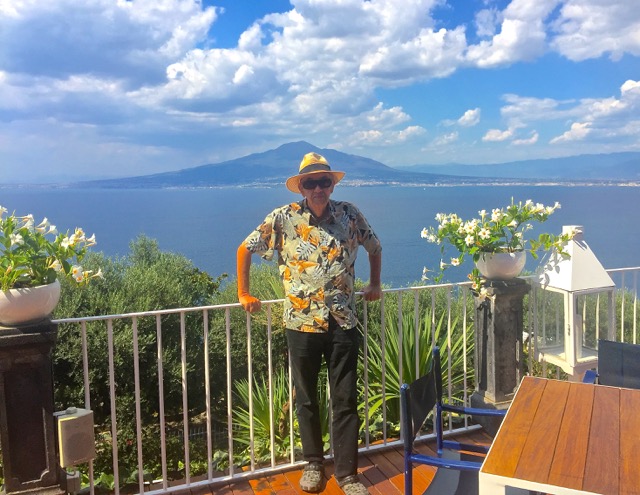
Pookie with the Bay of Naples and Vesuvius in the background
On the veranda, I had dinner of shrimp risotto accompanied by prosecco and finished off with a chocolate mousse ice cream and grappa while we watched the sun sink into the sea beyond Capri and the lights\ come on and twinkle like a necklace of fireflies around the base of Vesuvius.
The following morning, I arose early and with my cup of cappuccino and a glass of fruit juice I sat alone on the veranda and watched the sun climb above the hills behind me and strike the bay. I tried to understand why in the many years I have been coming to Italy and having so rarely planned to visit Naples, I seem almost always to end up here for at least a day or so. Beautiful the view of the bay and the volcano may be but, I have seen many places more so —although while I sat there, I was hard-pressed to name them.
As I continued to stare at Vesuvius across the bay with its string of buildings encircling its base I began to think about how wretched those buildings and neighborhoods actually were. They began to look to me more and more like a disease creeping up the slopes — as though the volcano suffered from psoriasis and would wake up someday from the itching on his flanks and burn it all off. That’s what Naples signifies, I thought, beauty and horror together — Pompey rich and licentious ending buried in lava, the Bourbon dynasty of the Kings of Naples, squalor, and corruption alongside elegance and art.
Caravaggio spent much of his career here in Naples. A drunkard and a vicious murderer and perhaps the greatest painter that ever lived. His painting of Narcissus gazing at his reflection in the pool of water is beautiful until you think about what the painting is about, someone imprisoned forever.
C. MATERA — A CITY CARVED FROM THE ROCKS.
The next day we were on the road to Matera in the Province of Basilicata. The drive took only about three hours, a relief after the grind of the past few days.
After leaving the hills of Calabria, we drove through the weary plains of Basilicata. The approach to Matera left much to be desired. We passed from forested mountains and rolling hills green with vineyards, fruit trees, and vegetable gardens, onto a large undulating plain of dry farming almost all of it wheat leaving the land with a bare desolate desiccated look.
Here and there the plain was crisscrossed with steep stone canyons invisible until looking down on them from the bridges spanning them. On the top of a broad rise in the terrain stood a large city, much larger than the small hill towns we had seen in Calabria and Basilicata so far, and much uglier also. I was quite disappointed and contemplated urging Hank to turn the car around and retrace our tracks to Naples.
We checked into an attractive newly built hotel that seemed to have a swimming pool with stepped smaller pools cascading into it. Excited, I put on my swim trunks, strode through the lobby and out to the pool. Alas, when I got there I found it was only a decorative fountain built to serve as a background for photos of lavish nuptial celebrations that seemed to be the main reason for the existence of the hotel. Dejected, I changed back into touring clothing and we set off to the town to see what the travel brochures raved about.
After a lot of aimless driving about the modern town looking for the rock city, we parked and followed the signs and suddenly came upon the amazing city carved from the rocks and perched upon the largest of the steep stone canyons, the smaller versions of which we had crossed while driving here.
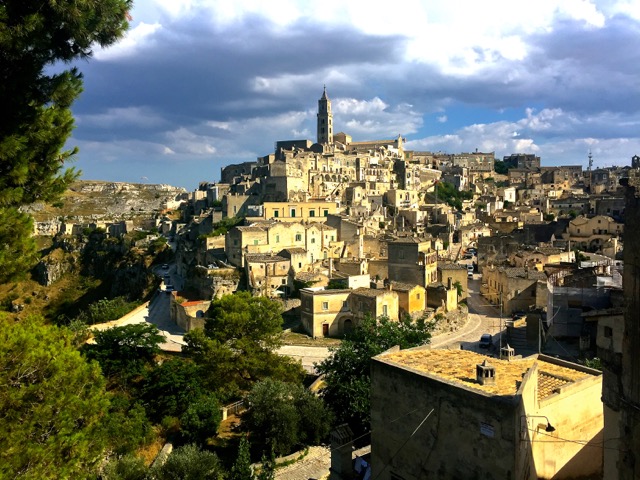
Matera — almost every building in the photograph of a facade covering the cave which provided at least 80% of the building’s interior.
We decided then that we could not fully appreciate the city without a guide so Hank asked the driver of a small tuk-tuk style tour vehicle how we could find a guide, “Wait here for Vito” he advised. So, we waited there for Vito. While waiting, Camille and I explored a nearby church containing another church buried underneath containing fascinating frescoes on the walls.
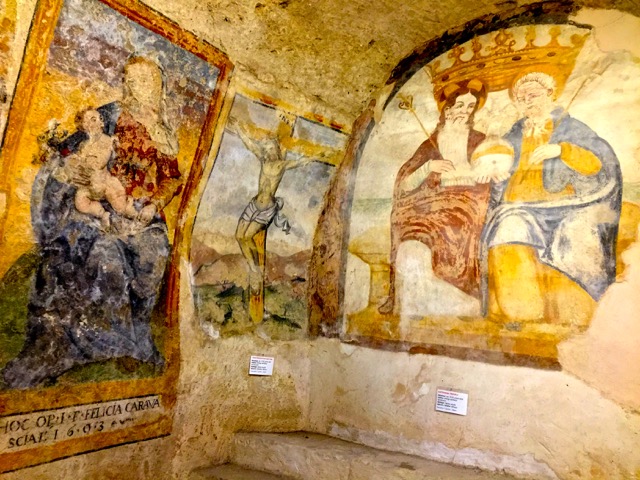
The mosaics painted on the walls of the cave church.
And, one of the more bizarre statues I have ever come across.
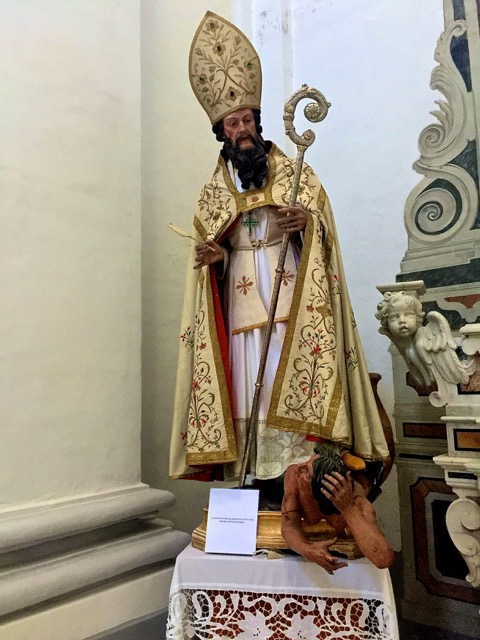
The Saint who steps on naked fat women.
It is a statue of Saint something or other (I do not remember his name) with his foot on the back of a naked woman. Finding this odd, I moved closer in order to read the information card. I translated it as either Saint what’s-his-name with his foot on a fat woman or, Saint whoever driving out fatness from women or maybe something else. Perhaps, he is the Patron Saint of diet scammers.
Vito arrived in his bitchin red tuk-tuk (as far as I could tell the only red one in town). He turned out to be a delightful young man who entertained us during the tour.
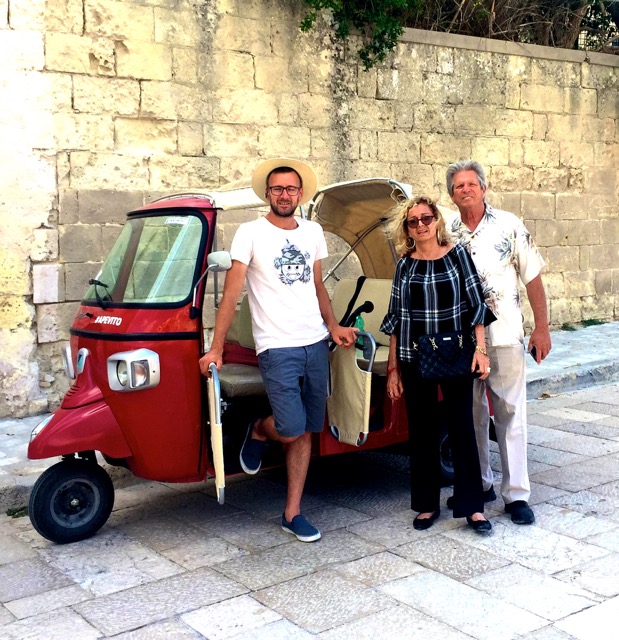
Vito and his bitchin red tuk-tuk with Hank and Camille.
(if you should travel there an want pleasant knowledgeable guide call Vito at +39 3931772506)
I could go on about the wonders of the town, but T&T is not the place for it. I will mention that Matera is the third oldest continuously occupied town in the world. Across the canyon stands the neolithic caves in which the ancestors of the townspeople lived before crossing the canyon to settle the current site when agricultural technology reached the area.
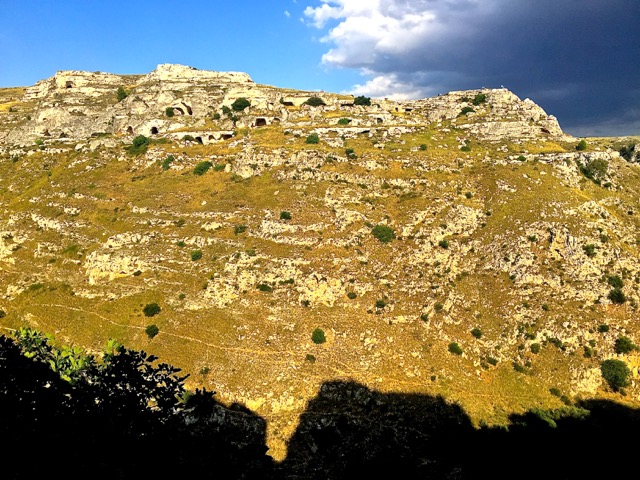
The Neolithic caves
Matera, despite being almost abandoned 30 years ago when the government forcibly relocated the penniless agricultural workers living in the rock homes, had experienced a rebound when that policy was abandoned and the original residents, artists, and others were allowed to move back in. Next year, according to Vito, the UN will declare the town the World Artistic Capital (or something pompous like that).
That evening we dined in what Vito declared was among the oldest and finest restaurants in town and was the favorite eating place of Mel Gibson who dined there often during the filming of the “Passion of Christ” (the crucifixion scene was filmed on top of the rock outcropping in the above photograph). While we felt that last was a dubious recommendation we dined there anyway and found it excellent and well worth it.
The next day we set off for Altamonte back in Calabria.
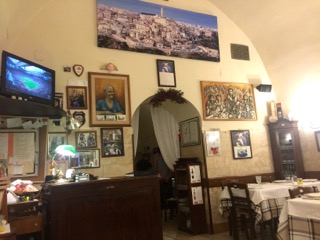
.
D. A PLEASANT DAY IN ALTAMONTE.
Altamonte a pleasant little hill town in Calabria, remote from just about anywhere with little to recommend it other than the Hotel Barbieri. Started by the patriarch of clan Barbieri a hotelier and master chef he has built up a small industry here and in the US selling regional Calabrian foods and folk art at the hotel and at a string of elegant delicatessens in Philadelphia and Pittsburg owned and operated by the family whose members have been sent to the US to manage their interests.
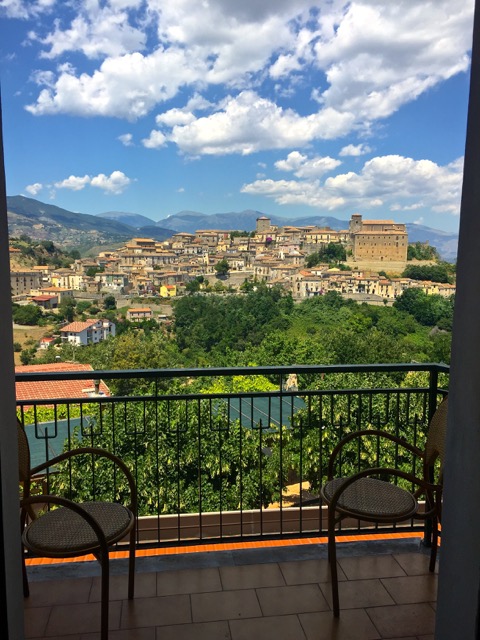
The view from my room.
The hotel started small on a hill with a great view of the town and the countryside around it, grew in a comely hodgepodge of rooms, verandas and a pool and a spa. Members of the family still run it day by day. “It serves the best Calabrian food in Italy,” Hank claimed.
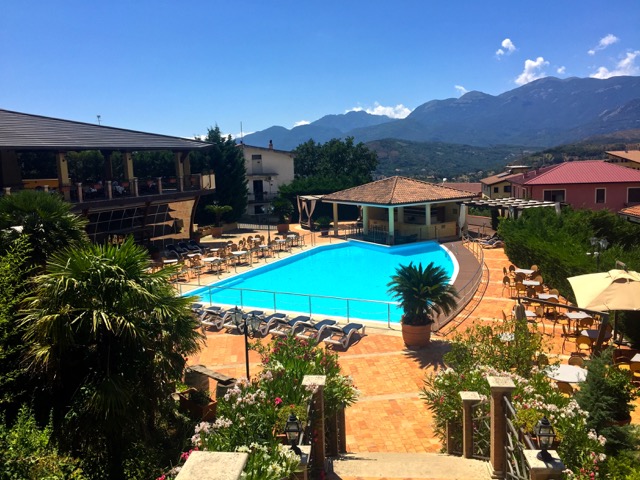
The pool and newly built terrace (we ate dinner on the terrace to the right)
We had a snack that included a local specialty, chips made from the local long red sweet peppers dipped momentarily in hot olive oil until they become puffed and brittle. Marvelous. We ate them and washed them down with prosecco under the trees on one of the verandas with a view of the town, a cool breeze and three children of the family playing and running around the tables.
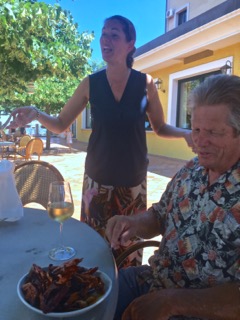
Hank, the daughter of the Patriarch, Hank and a bowl of sweet pepper chips.
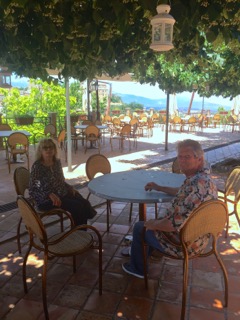
Camille and Hank on the terrace waiting for lunch.
I then took my much-delayed swim in the pool, napped and had dinner on one of the more formal terraces. We ate a variety of traditional Calabrian dishes and ended with a delicious homemade fusilli in a sauce of tomatoes and eggplant. The noodles are freshly hand rolled into long curving pasta with a hollow center and were delightfully chewy and went perfectly with the sauce. Grappa and dessert ended the meal. It was everything Hank said it would be.
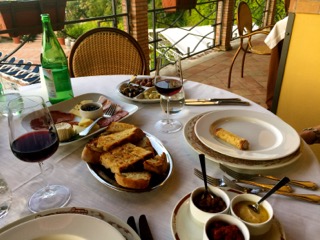
First course
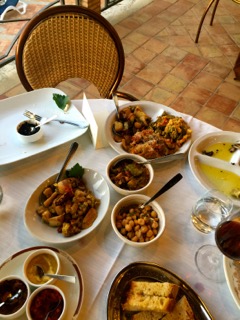
Second course
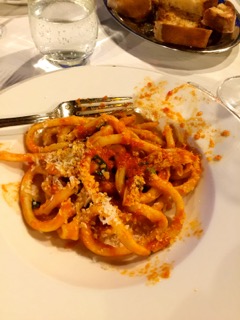
Fresh-made Fusilli
The next morning, after another great breakfast we said goodbye to the patriarch and his daughter who came by to see us off. And so I left for Sicily and a week ar Antonio’s.
PEPE’S POTPOURRI:
A. Today’s Poem:
My remark in the previous issue of T&T about the possibility of my becoming a “geriatric Boy Toy” generated a few humorous comments such as Peter’s “It sounds like an Asian food” and Ruth sending me her husband’s poem which I have reproduced below.
TOYBOYS
The world is full of pretty boys
The aging ladies’ favorite toys
If I were only twenty-two
I’d be some lady’s toyboy, too.
But sad to say I’m eighty-eight
And I’m afraid it’s just too late.
Bill Lansford ([c] William Douglas Lansford).
Alas, so true, so true — But is there still hope if you are only seventy-eight?
B. Giants of History: Peter responds to a challenge.
In the previous T&T, I hurled a challenge at Peter when I wrote:
I thought it was obvious my phone had been hacked in Verona. (“Hacked in Verona,” a movie starring John Goodman as an aging, fat, inept, hacker hiding out in Verona because of his erroneous belief he was being hunted by the police of several nations. Frances McDormand plays the Interpol receptionist dedicated to tracking him down to let him know that, in fact, no one was looking for him. She locates him in a one-room attic apartment two doors away from the “Juliet” house. They fall in love and she moves into the apartment. The film was so successful that its two stars were contracted to appear in its sequel, “Malaise in Verona.” — OK Peter the ball is in your court.)
He accepted the challenge and in a heroic effort flung back at me the following:
Sequels uber alleles. “Godfather” etc., “Rocky” etc., “Peewee’s Great Adventure”, etc. “Malaise in Verona”– bathos with mandolins. Saving grace: Monica Vitti, Anna Magnani, Giulletta Messina, and Sophia Lauren star as the Four Horsewomen of the Apocalypse. Our intrepid heroes Goodman and McDormand, wallowing in humid solicitude and a decent spaghetti sauce in a Verona pension, are interrupted by the Fab Four [who are aware of course that no one is looking for Goodman – after all, why would they?] who present the lucky couple with a dilemma: Why stay in Verona when you could be in Ravenna? The two are completely flummoxed by this question. Camera closeup: they look at each other, McDormand says “Why Indeed?” Goodman counters: “BFD- we could be in Ravello.” McDormand: “No. Puglia. The olives are better.” The four horsewomen interject: “Have you made up your minds?” Goodman: “Who are you, and where is that masked man?” The 4: “Chasing after Tonto. Last seen in Parma. The ham is good there. As to who we are, only Fellini knows for sure. You needn’t bother yourselves.” “Oh”, say the humid duo. “And anyway, Ravenna, Ravello, what’s the difference?” The 4: “We hate people who wave Occam’s razor around indiscriminately. In any case, Lucretius and Sartre are staring you in the face: which shall it be: Osso bucco con barbera or authenticity and rye crisp?” And that’s why they made Godfather III.
I concede.
TODAY’S QUOTE:
“Most cities lived on the very edge of civilization. Everyone talked about towns and villages out in the middle of nowhere as if they were uncivilized, but she’d found people in those places pleasant, even-tempered, and comfortable with their quieter way of life. Not in cities. Cities balanced on the edge of sustainability, always one step from starvation. When you pressed so many people together, their cultures, ideas, and stenches rubbed off on one another. The result wasn’t civilization. It was contained chaos, pressurized, bottled up so it couldn’t escape. There was a tension to cities. You could breathe it, feel it in every step.”
Sanderson, Brandon. Oathbringer: Book Three of the Stormlight Archive (p. 629). Tom Doherty Associates.
